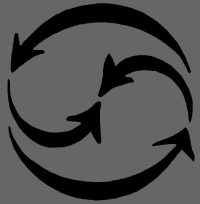The main links on this page connect up with the
exploration of how certain time-honoured religious practices can help
us make sense of our lives in the present day. How can the trance state
of the traditional tribal shaman, or the wit and wisdom of the ancient
Chinese mendicant-scholar, reveal to us essential aspects of our own
struggle? What have they to do with our own attempts to make sense of
who we are, what we are doing and where we are going?
The connection holds, only in the context of the theory of evolution
offered in these pages (mainly in the section entitled
Apes, Angels and Outlaws) - which posits
a close kinship between the personal struggles of you and me, with the
struggles engaged in by every human being. It will have been
essentially the same adventure, ever since we began our extraordinary
cultural/historical/evolutionary odyssey - with that earth-shaking
decision of
starting to talk to one another. If this
conjecture is valid, then you and I are actually brother and sister to
the shaman and to the Daoist scholar.
The shaman in his/her vision quest - traditionally described - is on a
journey to
another world - which perhaps also corresponds to
the "Underworld" of ancient Greek mythology. I am simply pointing up
the resemblance of this, to those regular trips that
all of us take
- our departure from present-time reality in the moments when our real
self or our real situation feels less desirable than the conjectures,
schemes, distractions and daydreams we may have addicted ourselves to.
I am suggesting that all of these wanderings of our conscious focus may
be regarded as
botched shamanic journeys - "botched" insofar
as they fail to lead us back into real present-time enriched with some
valuable cargo from the Underworld. When the journey is botched, we are
left to wander instead, half here and half not-here - not quite
realizing we have left the scene, and not quite able to find our way
back to where we belong.
Looked at this way, the test of success of the "trip" or "journey" is
the pragmatic criterion of
what is the quality of our
participation in reality after we have returned. Such questions
refer to an actual practice, and so long as we a sitting at our
computers, or reading our books, we are not in a position to really
answer them. We are treating with the question at one remove, at the
very least.
(The questions, in other words, are hypothetical and part of the
thought experiment we are engaged in here together. Within the confines
of this web-site we have to be satisfied to explore possibilities such
as this in our mind's eye, and to consider how they may join up with
the maps, theories and alternative perspectives which interweave in the
broad general approach I am offering here.)
The sections relating to the
Dao de Jing and the
Dao of
Beginning Again refer to a way of systematising or codifying the
shamanic experience. My belief
(1) is
that the early developers of the Dao-ist philosophy were a dispersed
community of seekers and scholars, who were attempting to live the
shamanic life in the many varied contexts of the sprawling empire of
ancient China - and to share and systematise their experience in an
array of working practices. The same hypothesis is to be found in the
work of Charlotte Bach, which we consider here in the section of this
site named
biology, culture and evolution.
(Readers should note that this is very much a minority viewg - and is
not subscribed to by the broad spectrum of anthropologists and other
enthusiasts on the scene.)
NOTE TO THIS SECTION
Here I am following the
interpretation that is to be found in the study by Michael Lafargue The
Tao of the Tao Te Ching











